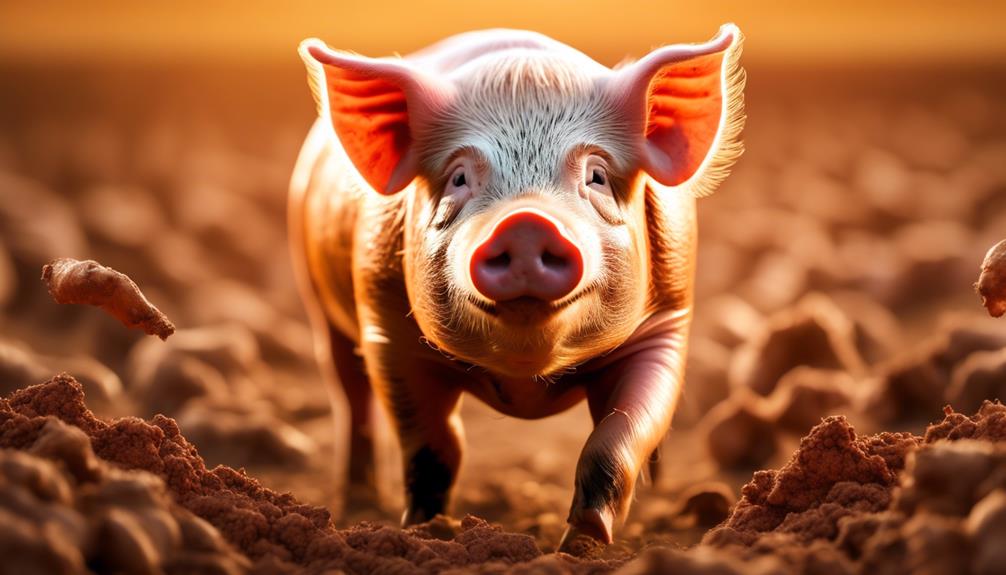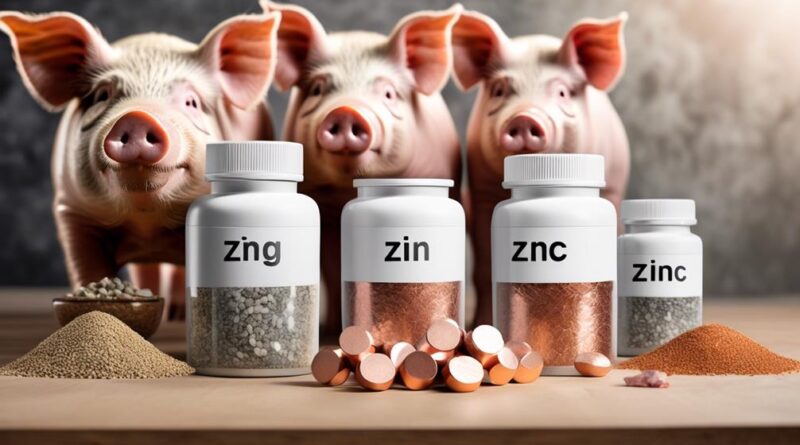3 Best Minerals Vital for Optimal Pig Nutrition
You may not realize it, but the quality of minerals in your pig's diet can significantly impact their overall health and growth. Among the numerous minerals that play a crucial role in pig nutrition, there are three that stand out as essential for optimal well-being.
These minerals are not only vital for the general health of your pigs but also have a direct influence on their growth, reproduction, and immunity. Understanding the significance of these minerals and ensuring their presence in your pig's diet is paramount for their overall health and well-being.
Importance of Minerals in Pig Nutrition
In pig nutrition, minerals play a critical role in maintaining overall health and supporting essential bodily functions. Mineral absorption is a key aspect of pig nutrition, as it directly impacts the animal's ability to utilize nutrients effectively. Without proper mineral absorption, pigs may experience deficiencies that can lead to various health issues.
To ensure optimal mineral absorption, it's essential to maintain a nutritional balance in the pig's diet. Nutritional balance is crucial for promoting efficient mineral absorption in pigs. When formulating pig diets, it's important to consider the interactions between different minerals and their impact on absorption. For example, an excess of one mineral can interfere with the absorption of another, leading to imbalances within the body. Therefore, achieving the right nutritional balance is essential for supporting overall health and maximizing mineral absorption in pigs.
To enhance mineral absorption and maintain nutritional balance, pig nutritionists carefully select and incorporate specific mineral sources into the animal's diet. These sources are chosen based on their bioavailability and ability to support optimal absorption. Additionally, factors such as the form of minerals, particle size, and interactions with other nutrients are taken into account to ensure that pigs receive the necessary minerals in a form that facilitates efficient absorption.
Role of Calcium in Pig Diets
When formulating pig diets, ensure that calcium is sourced strategically to support their overall health and performance. Calcium plays a crucial role in pig nutrition, particularly in calcium absorption and bone development. Adequate levels of calcium in pig diets are essential for ensuring optimal bone mineralization and skeletal development. It's important to provide a balanced ratio of calcium to phosphorus in pig diets, as an imbalance can negatively impact calcium absorption and utilization.
Calcium absorption is a critical process that directly influences the pig's ability to maintain skeletal health. Without sufficient calcium, pigs may experience weakened bones, which can lead to fractures and other skeletal problems. Proper calcium absorption is vital for supporting overall bone density and strength, thereby promoting the longevity and well-being of pigs.
Furthermore, bone development is a key aspect of pig growth and performance. Calcium is a major component of bone tissue, and it's essential for the formation and maintenance of strong skeletal structures. Inadequate levels of calcium in pig diets can result in stunted growth, skeletal deformities, and a higher susceptibility to bone-related disorders.
Significance of Phosphorus for Pig Health
Ensuring adequate levels of phosphorus in pig diets is crucial for supporting overall bone health and maximizing their growth potential. Phosphorus is a key mineral that plays a vital role in various physiological processes essential for the well-being of pigs.
- Phosphorus Absorption
- Pigs require efficient phosphorus absorption to support their bone development and overall skeletal structure. Without sufficient phosphorus, pigs may experience stunted growth and skeletal deformities, negatively impacting their welfare and productivity. It's essential to provide pigs with diets containing the appropriate levels of phosphorus to facilitate optimal absorption and utilization.
- Bone Development
- Phosphorus is a fundamental component of bone mineralization and plays a pivotal role in the formation and maintenance of skeletal tissues. Adequate phosphorus levels in pig diets are essential for ensuring proper bone development, structural integrity, and resilience. Insufficient phosphorus can lead to weak bones, fractures, and impaired mobility, compromising the overall health and welfare of pigs.
Zinc: Essential Mineral for Pig Growth
To support optimal growth in pigs, ensuring sufficient levels of zinc in their diets is crucial for promoting overall health and maximizing their growth potential. Zinc plays a pivotal role in various biological processes, including protein synthesis, immune function, and reproduction.
In terms of zinc absorption, it's important to note that the availability of dietary zinc sources significantly impacts the pig's ability to absorb this essential mineral. Factors such as the presence of phytates in feed can hinder zinc absorption, making it necessary to incorporate strategies that enhance bioavailability.
Dietary zinc sources can come from both organic and inorganic forms. Organic sources, such as zinc proteinate and zinc methionine, are generally more bioavailable compared to inorganic sources like zinc oxide and zinc sulfate. Utilizing a combination of these sources can help optimize zinc absorption in pigs, ensuring that they receive the necessary levels for growth and overall well-being.
Furthermore, incorporating additives such as phytase enzymes can aid in breaking down phytates, thus improving zinc absorption. Additionally, balancing the overall mineral composition in the diet can also influence zinc absorption. It's important to work closely with a nutritionist to formulate diets that not only provide sufficient zinc levels but also consider factors that affect its absorption.
Iron: Vital for Piglet Development
Iron is crucial for supporting optimal piglet development, facilitating various physiological processes essential for their growth and well-being. As a pig owner, ensuring adequate iron levels in piglet diets is essential for preventing anemia and promoting overall health.
Here's why iron is vital for piglet development:
- Hemoglobin Production: Iron is a key component of hemoglobin, the protein in red blood cells that carries oxygen to tissues. Adequate iron levels are crucial for piglets to develop healthy levels of hemoglobin, ensuring proper oxygen transport throughout the body.
- Anemia Prevention: Iron supplementation in piglet diets is essential for preventing anemia, a condition characterized by a decrease in the number of red blood cells or hemoglobin in the blood. Anemia can lead to reduced growth rates, weakness, and decreased immunity in piglets, ultimately impacting their overall development and well-being.
Incorporating iron supplementation into piglet diets is critical for supporting their growth and development. Additionally, providing piglets with access to iron-rich sources such as fortified feeds or supplements can help prevent anemia and promote optimal piglet health. By prioritizing iron in piglet nutrition, you can ensure that your piglets have the necessary support for healthy growth and development.
Magnesium's Impact on Pig Nutrition
In understanding the role of magnesium in pig nutrition, it becomes clear that this essential mineral plays a crucial part in supporting various physiological functions necessary for optimal pig health and well-being. Magnesium deficiency can lead to significant health issues in pigs, such as reduced feed intake, poor growth, and nervous system disturbances. Pigs require magnesium for proper bone development, muscle function, and enzyme reactions. Without adequate magnesium levels, pigs may experience muscle tremors, weakness, and incoordination, impacting their overall welfare and productivity.
Magnesium supplementation is a common practice to ensure pigs receive adequate levels of this vital mineral. It's often added to pig feed in the form of magnesium oxide or magnesium sulfate. However, it's crucial to carefully monitor the supplementation levels, as excessive magnesium can also lead to health complications. Providing pigs with a balanced diet that includes the right amount of magnesium is essential for preventing deficiencies or toxicities.
As a pig farmer, it's imperative to be vigilant about monitoring magnesium levels in your pigs' diet. Regularly assess the quality of feed and consult with a nutritionist to ensure that the magnesium content meets the pigs' requirements. By preventing magnesium deficiency and avoiding over-supplementation, you can support the overall health and well-being of your pigs, ultimately contributing to their growth and productivity.
Copper: Key Mineral for Pig Immunity

Ensuring the optimal health and well-being of your pigs, including their immunity, requires a comprehensive understanding of essential minerals such as copper, which plays a pivotal role in supporting their immune system function. The presence of copper is crucial for the overall health and disease resistance of your pigs.
Here's why copper is a key mineral for pig immunity:
- Copper Absorption
Copper is essential for the proper function of various enzymes involved in immune system regulation. It aids in the absorption of iron, another vital mineral for immune function, ensuring that your pigs can effectively utilize this nutrient to support their overall health.
- Immune Response
Copper is involved in the production and maturation of white blood cells, which are the frontline soldiers of your pigs' immune system. It also supports the function of antioxidants that help protect the immune cells from damage, thereby bolstering their ability to combat pathogens and infections effectively.
Selenium: Crucial for Pig Reproduction
Crucial for supporting optimal pig reproduction, selenium is a vital mineral that plays a significant role in ensuring the overall reproductive health of your pigs. Selenium supplementation is essential for sows during gestation and lactation, as it contributes to the proper development and function of the ovaries and uterus. This mineral is crucial for the production of healthy, viable sperm in boars, thereby influencing fertility and successful breeding outcomes. Moreover, selenium's antioxidant effects are pivotal for protecting the reproductive cells from oxidative damage, ultimately enhancing the chances of successful conception and reducing the risk of early embryonic loss.
When it comes to pig reproduction, selenium deficiency can lead to reproductive disorders such as irregular estrous cycles, increased stillbirths, and weak piglets. To prevent such issues, it's imperative to provide your pigs with adequate selenium through supplementation. This can be achieved by incorporating selenium-enriched feed or mineral supplements into their diet. Consult with a veterinarian or animal nutritionist to determine the most suitable selenium supplementation approach for your pig production system.
Frequently Asked Questions
What Are the Common Signs of Mineral Deficiencies in Pigs and How Can They Be Addressed?
If you notice common signs of mineral deficiencies in your pigs, like poor growth or hair loss, consider adjusting their diet. Addressing strategies could include providing mineral supplements or changing feed to meet their specific needs based on age and breed.
Are There Any Specific Pig Breeds or Age Groups That Require Different Mineral Supplementation?
Different pig breeds and age groups have specific nutritional requirements at different growth stages. Understanding these breed differences and age-related needs will help you tailor mineral supplementation to ensure optimal health and growth for your pigs.
How Do Environmental Factors, Such as Water Quality and Soil Composition, Impact Mineral Availability for Pigs?
Environmental factors, like climate, impact mineral availability for pigs. Pollution can also reduce mineral absorption. Water quality and soil composition play crucial roles. Ensure these factors are optimal to support the mineral needs of your pigs.
What Are Some Alternative Sources of Minerals That Can Be Used in Pig Nutrition, Aside From Traditional Feed Additives?
You can explore alternative sources like mineral-rich forages and mineral-enriched water to enhance mineral absorption and utilization in pig nutrition. These options offer diverse mineral profiles and can complement traditional feed additives effectively.
Can Over-Supplementation of Certain Minerals Have Negative Effects on Pig Health or Performance?
Over-supplementation of certain minerals can have negative effects on pig health and performance. It's important to carefully balance their intake to avoid adverse impacts. Excessive amounts can disrupt digestion and lead to reduced productivity.
Conclusion
In conclusion, ensuring that pigs receive the right balance of essential minerals is crucial for their overall health and growth.
Calcium, phosphorus, zinc, iron, magnesium, copper, and selenium play vital roles in pig nutrition, from bone development to immunity and reproduction.
By providing a well-balanced diet rich in these important minerals, pig farmers can help ensure the optimal health and productivity of their animals.
